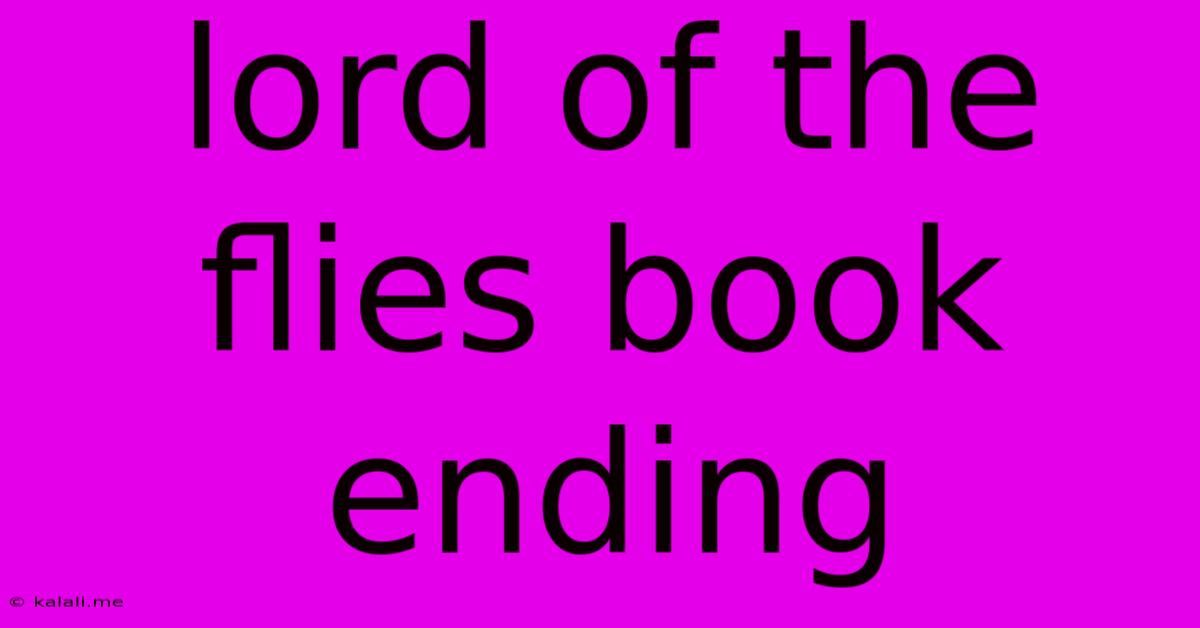Lord Of The Flies Book Ending
Kalali
May 22, 2025 · 3 min read

Table of Contents
The Lord of the Flies: A Chilling Conclusion and its Lasting Impact
The ending of William Golding's Lord of the Flies isn't simply a resolution; it's a devastating indictment of humanity's inherent savagery and a chilling commentary on the fragility of civilization. This article delves into the final moments of the novel, exploring its symbolism, thematic significance, and the lingering questions it leaves with the reader. Prepare for a discussion of spoilers – proceed only if you've read the book!
The Arrival of the Naval Officer: A Symbol of Rescue and Civilization's Imposition
The abrupt arrival of the naval officer, a representative of adult authority and established order, dramatically contrasts with the boys' descent into primal chaos. His appearance marks not just a rescue, but a forceful interruption of the island's microcosm. His presence immediately re-establishes the power dynamics and social structures the boys had abandoned. This is a stark reminder that civilization isn't an organic development but a imposed system, easily disrupted and perhaps inherently unstable.
Ralph's Tears: A Reaction to Loss and the Horror Witnessed
Ralph's tears upon encountering the officer are crucial. They aren't solely tears of relief. They represent a profound understanding of the horror he has witnessed and participated in, a grief for the loss of innocence, and the realization of humanity's darker potential. His sobbing isn't just a personal emotional release; it's a powerful symbol of the collective trauma experienced by the boys, and the weight of their actions.
The Significance of Piggy's Death: The Crushing of Reason and Innocence
Piggy's death, a pivotal moment earlier in the novel, casts a long shadow over the ending. Piggy represents intellect, reason, and the vestiges of civilization. His murder underscores the triumph of savagery and the vulnerability of those who advocate for rational thought amidst primal urges. His death, therefore, doesn't just foreshadow the climax; it fundamentally shapes the tone and significance of the final encounter.
The Symbolic Significance of the Fire and the Conch Shell
The fire, initially a symbol of hope and rescue, ultimately becomes a destructive force mirroring the boys' descent into violence. Its presence at the end, despite being used (unsuccessfully) to signal rescue at different points in the story, also hints at the destructive potential inherent within even seemingly positive tools. The broken conch shell, representing order and democracy, lies shattered on the beach—a powerful visual reminder of the boys' failure to maintain civility.
Interpreting the Ending: Multiple Perspectives and Enduring Questions
The ambiguous nature of the ending allows for multiple interpretations. Is the arrival of the officer a true rescue, or merely a temporary reprieve from a cycle of violence that will inevitably repeat itself? Does the inherent savagery of the boys reflect the innate darkness within all humanity, or is their behavior a product of their specific circumstances and lack of adult guidance?
These are the profound questions that Golding leaves us with. The novel’s chilling conclusion doesn't provide easy answers, but compels readers to confront the complexities of human nature and the fragile balance between civilization and savagery. The haunting image of Ralph's tears remains a potent symbol of the lasting impact of the island's experience, a testament to the inherent darkness that lurks beneath the surface of even the most seemingly civilized societies.
The Enduring Legacy of Lord of the Flies
The lasting impact of Lord of the Flies stems from its unflinching exploration of human nature. The book's enduring relevance lies in its ability to spark crucial conversations about the dangers of unchecked power, the importance of rational thought, and the enduring struggle between civilization and savagery. The novel's ending, far from being a simple conclusion, is a powerful and unsettling reminder of the fragility of society and the ever-present threat of our own primal instincts.
Latest Posts
Latest Posts
-
Empty Barrels Make The Most Noise
May 22, 2025
-
How To Get Super Glue Off Eyeglass Lenses
May 22, 2025
-
Why Are Hash Browns Called Hash Browns
May 22, 2025
-
How Did Jay Gatsby Earn His Money
May 22, 2025
-
How To Re Pair Apple Watch Without Resetting
May 22, 2025
Related Post
Thank you for visiting our website which covers about Lord Of The Flies Book Ending . We hope the information provided has been useful to you. Feel free to contact us if you have any questions or need further assistance. See you next time and don't miss to bookmark.